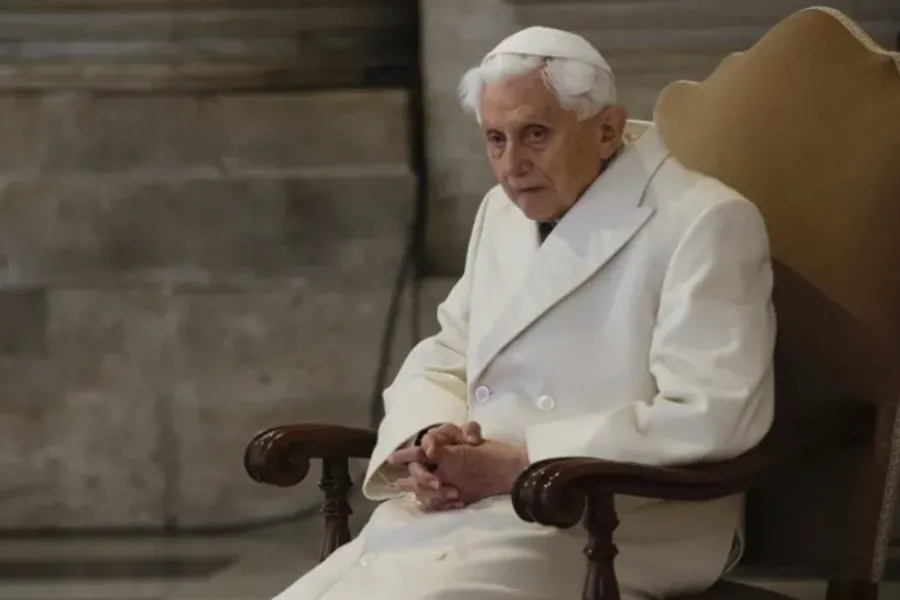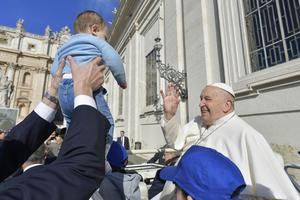Who Is Benedict XVI? Cardinal Filoni Shares His Testimony
‘I can testify first of all to his profound and very high moral and intellectual honesty.’

Who is Benedict XVI? This is the question that has emerged in the minds of many in recent days; days of great suffering for him and for the Church.
At the beginning of his pontificate in 2005, he wanted to say that he saw himself as a humble servant in the vineyard of the Lord, thinking of the parable found in the Gospel of Matthew (21:33-43). In that parable, Jesus criticized the behavior of those who, by their infidelity, ruined the vineyard planted with sacrifice and devotion. In that vineyard, loved by God, the owner had sent workers to ensure it was well cultivated. It belonged to him, and the workers should have taken care of it and not taken possession of it.
I have known Benedict XVI personally above all because, at the beginning of his papal ministry, he called me to Rome from the Philippines, where a year earlier he had assigned me as his papal representative.
I remember well our first meeting; it was at the beginning of July 2007. He had appointed me substitute (sostituto) of the Secretariat of State, that is, one of his closest collaborators. This allowed me to visit him at least once a week to talk about the issues that were close to his heart and receive appropriate guidance on many aspects of the life of the Curia and the Church.
The office of substitute was also entrusted with the organization of papal trips, so that, during the four years that I remained in office, before being appointed prefect of the Congregation for the Evangelization of Peoples, I had the opportunity to accompany him to the various countries where he made his apostolic journeys.
In those years, the issue of pedophilia emerged with virulence in the Church. It was not known in the terms with which it has since gradually emerged. But it was always clear to me that Benedict XVI was willing to face it with determination.
In this, I can testify first of all to his profound and very high moral and intellectual honesty.
This is unquestionable, even if there is no shortage of those who today are railing against him. They are free to do so, but I can affirm that I have never found in him any shadow or attempt to hide or minimize anything. Nor can his sensitivity in dealing with things with a profound moral sense be mistaken for uncertainty or anything else.
I also know well his immense distress in the face of serious ecclesial questions, and I clearly remember an expression he used to utter with a deep sigh: “How inscrutable is the abyss into which we fall because of human misery!” This distressed him intimately, and he sometimes remained silent for a long time — all the more so if these human miseries touched men of the Church.
He had a noticeable sensitivity for the victims. When, in preparation for apostolic trips (to the United States, Australia, etc.), he received requests for meetings with victims of abuse, he told me about them; he wanted to know my thoughts on how to accommodate these requests.
I can affirm that he advised two things that were very important to him.
1) Deep respect for the victims whose identity had to be safeguarded; therefore, he wanted the meetings to take place far from the gaze of cameras or other visual instruments. He did not want any spectators, but he wanted me to be among the very few who were discreetly present.
2) He did not want the meeting to be a sort of “audience,” with a simple handshake and a quick glance, but a real prayer meeting; it should have a spiritual dimension and take place in front of God, from whom one should implore mercy.
For this reason, he accepted the idea that the meetings should take place in the chapel, in front of the Holy Eucharist. Thus, after a few minutes of prayer with the victims, after some heavy emotional moments, he would pray the Our Father with them; he paid attention to each of them, listened with visible and palpable emotion, and, at the end, he entrusted a rosary to each one.
In those encounters, there was not only the sense of the humiliation suffered by the victims, but also the humiliation of a man of the Church who could never have imagined that such degrading actions could happen, and yet now offered the balm of a prayer and the relief of solidarity in the name of that God who had humbled himself and taken on his shoulders the human condition and its sins.
In every encounter there was always a true recognition that the human and spiritual had been violated. There was always the entrustment to God made by deeply moved brothers and sisters; there was a request for forgiveness from the whole Church to God, and there was a commitment that would see Benedict XVI combine mercy and justice. That he did through steps that previously had not existed.
This is the Benedict XVI who I have known up close. A “pastor,” a “worker” in the vineyard of the Lord, who had in his heart — always — a profound “solicitude for all the Churches” and for an afflicted, fallen and godless humanity, in accordance with what he said when he visited, on that distant afternoon of April 25, 2005, the Basilica of St. Paul Outside the Walls, where the “Apostle of the Gentiles” reposes.
Cardinal Fernando Filoni is the grand master of the Equestrian Order of the Holy Sepulchre of Jerusalem. This article was first published by ACI Stampa, CNA’s Italian-language news partner.
- Keywords:
- Cardinal Fernando Filoni
- benedict xvi



















